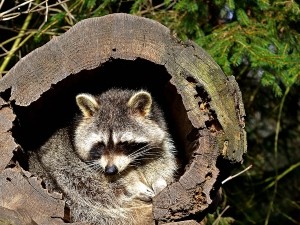
To humans, being up during the day is normal, but not for raccoons. So, why are raccoons nocturnal?
Raccoons are nocturnal to avoid predators, many predators and predators of the past like dinosaurs were out at night, thus, raccoons became nocturnal to evade them. Also, at night, there is less competition for food and being out during the day can lead to overheating in raccoons.
Humans are active during the day, we are diurnal. But there are a number of animals that are active at night, one of these animals is the raccoon. Raccoons sleep during the day and forage during the night. To humans, this can seem very strange and the question on your mind may be: why are raccoons nocturnal? This article will explain all you need to know. So whether you’re are a wildlife enthusiast, a raccoon lover or are simply curious, this article is for you.
Table of Contents
Why are raccoons nocturnal?
There are a few reasons why raccoons are nocturnal. We know that these animals forage for food during the night and sleep during the day. One of the reasons why they do this is to avoid humans. Raccoons are gentle and docile animals that are shy of humans. Staying up at night and sleeping during the day is a survival tactic to maintain the species as humans can harm them.
Another reason for them being nocturnal is that there are many predators out during the day. During the age of dinosaurs, dinosaurs were out during the day. So to avoid being eaten, raccoons evolved and became nocturnal animals. It is easier to avoid detection during the night because of their dark fur, in addition, predators can see at night but overall, their vision isn’t as clear as it is during the day.
There is less competition for food during the night. Many animals that sleep during the night and wake up during the day have an easier time finding food. The benefits of raccoons being up at night is that they won’t have to fight or compete with many other animals for food, it can forage in peace and eat its fill. It can also focus on feeling it’s children rather than fighting off other animals looking for the same food
Raccoons have a very thick coat of fur, if they were to be active during the day they would overheat and this is not good for them. When they are out during the night, the cooler air prevents them from overheating as they look for food. They sleep in cool and shaded dens during the day and are not exposed to the hot sunlight
What are the cons of raccoons being nocturnal?
A con of raccoons being nocturnal is that they come into contact with predators of the night. These predators have adapted to being out during the night as well, they’ve needed to adapt to be able to catch their prey. Many predators are able to see at night which gives them an advantage
In addition, although the darkness makes it more difficult for predators to see and makes it easier for raccoons to move around, it also makes it easier for predators to sneak up on raccoons and pounce.
How are raccoons equipped to be nocturnal?
Since raccoons do not have good eyesight, and are nocturnal, their other senses have developed to be able to help them make their way around and to keep them safe from predators.
Raccoons have an excellent sense of smell, their olfactory sensors are very advanced. They forage for food at night while it’s dark, they can’t see so their sense of smell has developed to help them seek out food. When they smell food, they change direction to find it until they do
Another way that raccoons are equipped to be nocturnal is through their hearing. If a predator makes a wrong move and is heard the raccoon has a chance to flee before it’s caught. It does not need to see the predator to know that it’s there. This is beneficial as it keeps the raccoons safe to some degree during the night and thus maintains the raccoon population
Because raccoons can’t clearly see the food that they find they use their hands to determine what it is. Their hands have sensory nerves which communicate to the brain what they’re holding. This is why they sometimes wash food before eating, the water excites the nerves which better communicates what they’re holding.
Summary
In summary, raccoons are nocturnal because many predators and predators of the past like dinosaurs were out at night, they became nocturnal to evade them. Also, there is less competition for food at night and being out during the day can lead to overheating. They have adapted to being up at night, they have a great sense of smell and a great sense of hearing
If you enjoyed this article then you may also be interested in other raccoon related articles. Here are some articles that you may be interested in: why do raccoons tear up lawns, how do raccoons find food, why are raccoons different colours, what do urban raccoons eat, why are raccoons protected


